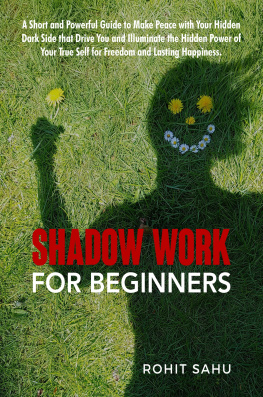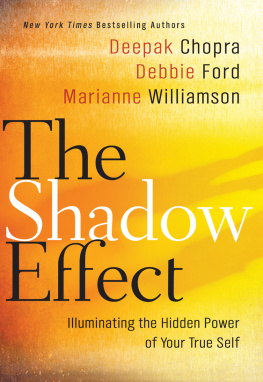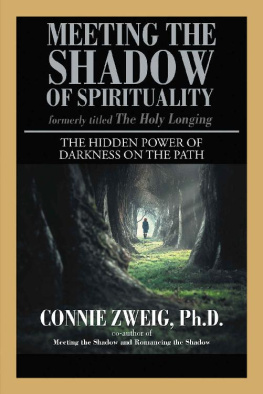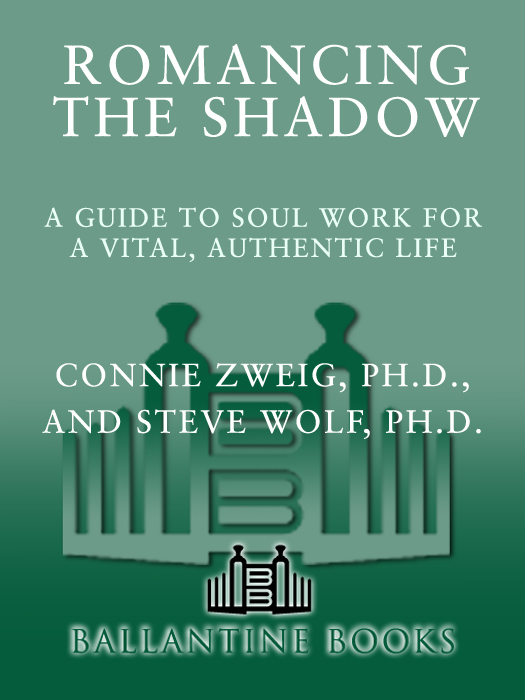
More praise for Romancing the Shadow
Romancing the Shadow has changed the way I perceive myself and the people I love. Its brilliant, compassionate, and challengingproviding readers with a structure through which they can reconnect with their spirit. I use it now to examine every character I am and every character I write about.
Sheri Reynolds
Author of The Rapture of Canaan
The secret is out: all of us, no exceptions, have qualities we wont let anyone see, including ourselvesour shadow. If we face up to our dark side, our life can be energized. If not, there is the devil to pay. This is one of lifes most urgent projects.
Larry Dossey, M.D.
Author of Healing Words
Throughout this book we are invited to undertake the ordeal and passion of discovering the richness in our individual darkness, thereby creating soulful and expressive lives. The authors restore us to ourselves.
Deena Metzger
Author of Writing for Your Life:
A Guide and Companion to the Inner Worlds
This book is a great help to anyone trying to tune in and listen to the voice of the soul. At last, a practical mysticism!
Coleman Barks
Poet-translator of The Essential Rumi
This fascinating work not only offers an accessible exploration of the mysterious dark side of human nature but also provides tools for a more authentic way of living.
Body, Mind, Spirit
Replacing murky psychological language with easily understood stories and characters, Jungian psychotherapists Wolf and Zweig offer myth-based modern parables for reconnecting with our dark sides.
Publishers Weekly
The shadow is, by definition, often overlooked. This is a definitive work on the topic that helps us grow into greater authenticity and experience our full humanity.
Dan Millman
Author of Way of the Peaceful Warrior
Romancing the Shadow is a wide-ranging and eye-opening treatment of a complex subject.
Values & Visions
Romancing the Shadow is a must for those seeking greater self-knowledge and compassion for others.
Jack Canfield
Author of Chicken Soup for the Soul series
This is a timeless, inexhaustible book, to be read and re-read, as valuable to the knowledgeable person as to the personally motivated. It is practical and thorough, packed with fascinating information that leaps off the page into the readers life.
The Association of Humanistic
Psychology: Perspectives
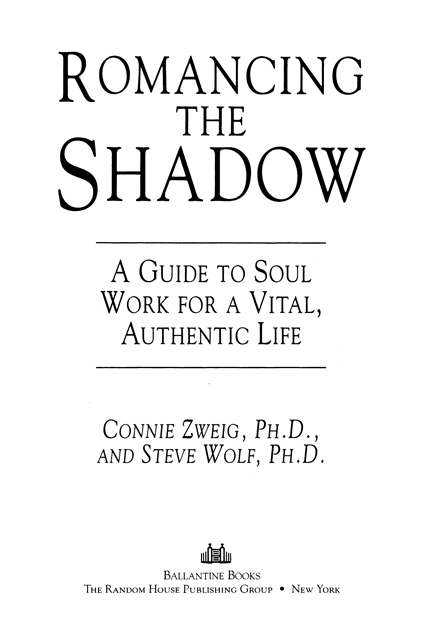
A Ballantine Book
Published by The Random House Publishing Group
Copyright 1997 by Connie Zweig, Ph.D., and Steve Wolf, Ph.D.
All rights reserved.
Published in the United States by Ballantine Books, an imprint of The Random House Publishing Group, a division of Random House, Inc., New York, and simultaneously in Canada by Random House of Canada Limited, Toronto.
Ballantine and colophon are registered trademarks of Random House, Inc.
Grateful acknowledgment is made to the following to reprint previously published material:
Coleman Barks and Maypop: The Guest House by Jelaluddin Rumi from Say I Am You, translated by John Moyne and Coleman Barks, published 1994 by Maypop. Reprinted by permission of Coleman Barks and Maypop.
HarperCollins Publishers, Inc.: Excerpt from Sometimes a Man Stands Up from Selected Poems of Rainer Maria Rilke, edited and translated by Robert Bly. Copyright 1981 by Robert Bly. A Man and a Woman Sit Near Each Other from Selected Poems by Robert Bly. Copyright 1986 by Robert Bly. Reprinted by permission of HarperCollins Publishers, Inc.
Hardie St. Martin: Throw Yourself Like Seed by Miguel de Unamuno from Roots and Wings by Miguel de Unamuno, translated by Robert Bly. Reprinted by permission of Hardie St. Martin.
Threshold Books: The Minute I Heard by Jelauddin Rumi from Essential Rumi, translated by Coleman Barks, originally published by and reprinted by permission of Threshold Books, 139 Main Street, Brattleboro, VT 05301.
Viking Penguin and Laurence Pollinger Limited: Healing by D. H. Lawrence from The Complete Poems of D. H. Lawrence by D. H. Lawrence, edited by V. de Sola Pinto and F. W. Roberts. Copyright 1964, 1971 by Angelo Ravagli and C. M. Weekley, Executors of the Estate of Frieda Lawrence Ravagli. Reprinted by permission of Viking Penguin, a division of Penguin Books USA Inc. and Laurence Pollinger Limited for the Estate of Frieda Lawrence Ravagli.
www.ballantinebooks.com
Library of Congress Catalog Card Number: 98-96663
eISBN: 978-0-307-55948-7
v3.1_r1
C ONTENTS
I NTRODUCTION TO S HADOW -W ORK
Perhaps all the dragons of our lives are princesses who are only waiting to see us once beautiful and brave. Perhaps everything terrible is in its deepest being something helpless that wants help from us.
R AINER M ARIA R ILKE
I n Oscar Wildes only novel, The Picture of Dorian Gray, the central character, Dorian, a beautiful, vain young man in nineteenth-century England, sees a painting of himself that is startlingly handsome and without a blemish. Suddenly, he desires to remain youthful and perfect forever, with no sign of aging or imperfection. To this end, he makes a pact with the devil: All signs of his aging and degeneration, even evidence of his greed and cruelty, would from then on appear on the painting rather than on his own face. And the painting gets hidden away, never to be seen by anyone. But from time to time the young mans curiosity gnaws at him. He cautiously pulls the picture out of the darkness and takes a quick glance, only to see the youthful face growing more and more hideous.
Each of us is like Dorian Gray. We seek to present a beautiful, innocent face to the world; a kind, courteous demeanor; a youthful, intelligent image. And so, unknowingly but inevitably, we push away those qualities that do not fit the image, that do not enhance our self-esteem and make us stand proud but, instead, bring us shame and make us feel small. We shove into the dark cavern of the unconscious those feelings that make us uneasyhatred, rage, jealousy, greed, competition, lust, shameand those behaviors that are deemed wrong by the cultureaddiction, laziness, aggression, dependencythereby creating what could be called shadow content. Like Dorians painting, these qualities ultimately take on a life of their own, forming an invisible twin that lives just behind our life, or just beside it, but as distinct from the one we know as a stranger.
This stranger, known in psychology as the shadow, is us, yet is not us. Hidden from our awareness, the shadow is not a part of our conscious self-image. So it seems to appear abruptly, out of nowhere, in a range of behaviors from off-color jokes to devastating abuses. When it emerges, it feels like an unwanted visitor, leaving us ashamed, even mortified. For instance, when a man who views himself as a responsible husband and provider is suddenly taken over by a dream of freedom and independence, his shadow is speaking. When a woman with a health-conscious lifestyle craves ice cream and feels compelled to binge in the dark of night, her shadow is acting out. When a normally kind mother belittles her child, her shadow is showing. When a pious priest sneaks off to find a prostitute in a back alley, his shadow is erupting.




